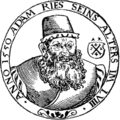March 30
Are You Sure ... (March 30)
• ... that mathematician Stefan Banach is the namesake of Banach spaces, Banach algebras, the Banach–Tarski paradox, the Hahn–Banach theorem, the Banach–Steinhaus theorem, the Banach-Mazur game, the Banach–Alaoglu theorem, and the Banach fixed-point theorem?
• ... that physicist Charles Vernon Boys achieved recognition as a scientist for his invention of the fused quartz fiber torsion balance, which allowed him to measure extremely small forces, and that Boys made the fused quartz fibers for his instrument by attaching a quartz rod to a crossbow quarrel, heating the rod to the point of melting, and firing the crossbow, and that by this means he produced fiber so thin that it could not be resolved with an optical microscope?
• ... that mathematician Harold Scott "Donald" Coxeter composed music in his youth and was an accomplished pianist at the age of 10, and that Coxeter felt that mathematics and music were intimately related, outlining his ideas in a 1962 article on "Mathematics and Music" in the Canadian Music Journal?
• ... that mathematician Adam Ries wrote several books on practical mathematics, including Rechnung auff der linihen ("Reckoning on the Line", 1518), which describes calculation on a calculating board, a kind of abacus, and that according to the foreword the second edition was expressly intended for children?
On This Day in History and Fiction
1599: Mathematician Adam Ries dies. Reis wrote textbooks for practical mathematics, promoting the advantages of Arabic/Indian numerals over Roman numerals.
1606: Mathematician and astronomer Vincentio Reinieri born. Reinieri revised and finished the work of Galileo, who before his death placed all of the papers containing his observations and calculations in Reinieri's hands.
1811: Chemist and academic Robert Bunsen born. Bunsen will investigate emission spectra of heated elements, and discover caesium (in 1860) and rubidium (in 1861) with the physicist Gustav Kirchhoff.
1886: Mathematician, philosopher, and logician Stanisław Leśniewski born. Leśniewski will posit three nested formal systems, to which he will give the Greek-derived names of protothetic, ontology, and mereology.
1892: Mathematician and academic Stefan Banach born. Banach will be one of the founders of modern functional analysis.





